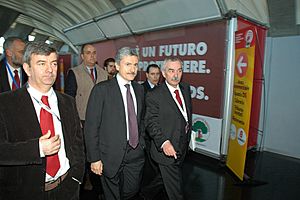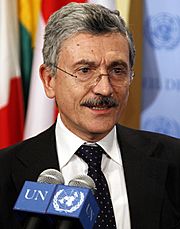Massimo D'Alema facts for kids
Quick facts for kids
Massimo D'Alema
|
|||||||||||||||||||||||||||||||||||||
|---|---|---|---|---|---|---|---|---|---|---|---|---|---|---|---|---|---|---|---|---|---|---|---|---|---|---|---|---|---|---|---|---|---|---|---|---|---|
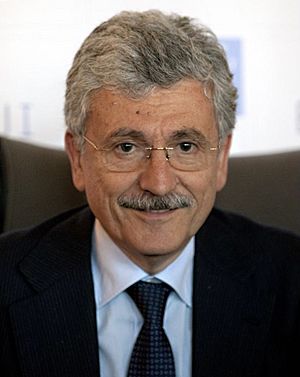 |
|||||||||||||||||||||||||||||||||||||
| Prime Minister of Italy | |||||||||||||||||||||||||||||||||||||
| In office 21 October 1998 – 26 April 2000 |
|||||||||||||||||||||||||||||||||||||
| President | Oscar Luigi Scalfaro Carlo Azeglio Ciampi |
||||||||||||||||||||||||||||||||||||
| Deputy | Sergio Mattarella | ||||||||||||||||||||||||||||||||||||
| Preceded by | Romano Prodi | ||||||||||||||||||||||||||||||||||||
| Succeeded by | Giuliano Amato | ||||||||||||||||||||||||||||||||||||
| Deputy Prime Minister of Italy | |||||||||||||||||||||||||||||||||||||
| In office 17 May 2006 – 8 May 2008 |
|||||||||||||||||||||||||||||||||||||
| Prime Minister | Romano Prodi | ||||||||||||||||||||||||||||||||||||
| Preceded by | Giulio Tremonti | ||||||||||||||||||||||||||||||||||||
| Succeeded by | Angelino Alfano | ||||||||||||||||||||||||||||||||||||
| Minister of Foreign Affairs | |||||||||||||||||||||||||||||||||||||
| In office 17 May 2006 – 8 May 2008 |
|||||||||||||||||||||||||||||||||||||
| Prime Minister | Romano Prodi | ||||||||||||||||||||||||||||||||||||
| Preceded by | Gianfranco Fini | ||||||||||||||||||||||||||||||||||||
| Succeeded by | Franco Frattini | ||||||||||||||||||||||||||||||||||||
| Vice-President of the Socialist International | |||||||||||||||||||||||||||||||||||||
| In office 29 October 2003 – 29 August 2012 |
|||||||||||||||||||||||||||||||||||||
| President | António Guterres George Papandreou |
||||||||||||||||||||||||||||||||||||
| In office 11 September 1996 – 7 November 1999 |
|||||||||||||||||||||||||||||||||||||
| President | Pierre Mauroy | ||||||||||||||||||||||||||||||||||||
|
|||||||||||||||||||||||||||||||||||||
|
|||||||||||||||||||||||||||||||||||||
| Personal details | |||||||||||||||||||||||||||||||||||||
| Born | 20 April 1949 Rome, Italy |
||||||||||||||||||||||||||||||||||||
| Political party | PCI (1963–1991) PDS (1991–1998) DS (1998–2007) PD (2007–2017) Art.1 (2017–2023) |
||||||||||||||||||||||||||||||||||||
| Spouse | Linda Giuva | ||||||||||||||||||||||||||||||||||||
| Children | 2 | ||||||||||||||||||||||||||||||||||||
Massimo D'Alema (born 20 April 1949) is an Italian politician and journalist. He served as the Prime Minister of Italy from 1998 to 2000. He was also the Deputy Prime Minister of Italy and Italian Minister of Foreign Affairs from 2006 to 2008.
D'Alema was a member of the Italian Communist Party (PCI) early in his career. He was the first former Communist party member to become prime minister of a NATO country. He is also the only former PCI prime minister of Italy. People sometimes call him Leader Maximo ("Maximum Leader") because of his first name and his important role in left-wing politics. He has also written several books.
D'Alema joined the PCI in 1963. He was part of the party's main committees. From 1975 to 1980, he led the Italian Communist Youth Federation. He supported the change that led to the PCI becoming the Democratic Party of the Left (PDS). He also helped create The Olive Tree political group, which won the 1996 election. In 1998, the PDS changed into the Democrats of the Left (DS), and D'Alema became prime minister that same year.
He was a member of Italy's Chamber of Deputies from 1987 to 2004 and again from 2006 to 2013. He was also a Member of the European Parliament from 2004 to 2006. In 2007, he joined the Democratic Party (PD). He later left the PD in 2017 to help start Article One.
Contents
Early Life and Education
Massimo D'Alema was born in Rome on 20 April 1949. His father, Giuseppe D'Alema, was a partisan (a fighter in a resistance group) during World War II and a communist politician.
Massimo joined the Italian Communist Party (PCI) when he was 14. He started his political journey in Pisa, where he was studying philosophy. The PCI leader at the time, Palmiro Togliatti, called him an enfant prodige (a very talented young person). D'Alema also took part in the protests of 1968.
Political Career
Leading the Communist Youth
In 1975, D'Alema became the national secretary of the Italian Communist Youth Federation (FGCI). During this time, he met Walter Veltroni. They had different ideas but worked together. Veltroni later said that D'Alema was more focused on leading the youth group strictly, while he was more open to new ideas.
In 1983, D'Alema became the regional secretary for the PCI in Apulia. The PCI leader, Enrico Berlinguer, sent D'Alema to China to improve relations with the Chinese Communists. D'Alema also went with Berlinguer to Moscow for a funeral in 1984.
During the 1980s, the PCI faced challenges. D'Alema explained that fewer people were joining political parties, not just in Italy but across Western countries. He said the PCI was more open about its membership numbers than other parties. Around this time, the Soviet Union broke apart, which led to big changes for the PCI.
From 1988 to 1990, D'Alema was the director of L'Unità, a newspaper that was linked to the PCI and later to the DS. He also wrote for other newspapers. D'Alema was known for being direct, which some journalists found difficult. He believed that the media had become too powerful and could harm political leaders. However, he later adapted to the changing media world and appeared on TV shows.
From Communist Party to Democrats of the Left
D'Alema joined the PCI's national leadership in 1986. He supported the party's change into the Democratic Party of the Left (PDS) in 1991. He was a key figure in this transformation. In 1998, the PDS became the Democrats of the Left (DS).
In 1994, D'Alema ran to become the PDS secretary after Achille Occhetto resigned. He won against Walter Veltroni. As PDS secretary, D'Alema tried to improve relations with Silvio Berlusconi. After the PDS lost the 1994 election, D'Alema supported creating The Olive Tree group. This group included different political forces, from secular to Catholic.
D'Alema believed that the party's ideas, based on Marxism, needed to be updated. He wanted to create a modern social-democratic party like those in Western Europe. He was a member of the Chamber of Deputies from 1987. He led the PDS group in Parliament from 1992 to 1994. In July 1994, he became the party's national secretary.
Under his leadership, the PDS strongly opposed the first Berlusconi government (1994–1995). Then, it supported the government led by Lamberto Dini (1995–1996).
In 1998, D'Alema became Prime Minister of Italy. He took over from Romano Prodi. His government was supported by The Olive Tree group, which had won the 1996 election. D'Alema was the first prime minister born after Italy became a republic in 1946. He was also the first former Communist party member to lead a NATO country.
He worked on making changes to Italy's government system. In February 1997, he led a special committee for constitutional reforms. In February 1998, the DS party was officially formed. It brought together the PDS and other groups. D'Alema became prime minister when another party stopped supporting Prodi's government. He then led a new centre-left government.
Leading Centre-Left Governments
Prime Minister of Italy
D'Alema became prime minister with support from different political groups. A month after becoming prime minister, he left his role as DS secretary to Veltroni and became the party's president. His first government focused on improving Italy's finances and selling state-owned businesses.
There were disagreements within his government, especially with a new group called The Democrats. Italy also faced international challenges. In 1999, Italy took part in the NATO bombing of the Federal Republic of Yugoslavia.
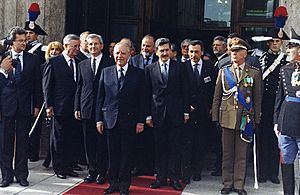
D'Alema supported Italy's involvement in the NATO air strikes against Yugoslavia to help Kosovo in 1999. This action was also supported by Silvio Berlusconi and the right-wing opposition. However, some left-wing groups strongly disagreed. After some election setbacks in June 1999 and new tensions, D'Alema's government resigned in December 1999. A second D'Alema government was then formed, giving more power to The Democrats.
As party leader and prime minister, D'Alema often debated with Sergio Cofferati, the head of the CGIL trade union. D'Alema believed that the world of work was changing, with more temporary jobs and flexible work. He argued that unions needed to adapt to these new realities. He also promoted a conference on the "Third Way," which was a new approach to left-wing politics, with leaders like Bill Clinton and Tony Blair attending.
In 1998, D'Alema suggested creating a new, larger left-wing party. This led to the DS changing its name and symbol. At the 2001 party meeting, D'Alema supported Piero Fassino for party secretary. D'Alema was one of the few centre-left leaders who faced opposition from the CGIL union. He was sometimes criticized for his policies and his personality.
In 1999, D'Alema hosted a meeting in Florence with several world leaders, including Clinton and Blair. He encouraged businesses to grow and invest. After his party lost the 2000 regional elections, he stepped down as prime minister and DS president. In December 2000, he became president of the DS again.
European Parliament and Foreign Minister
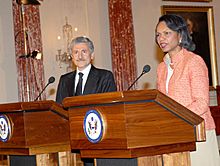
From 2004 to 2006, D'Alema was a Member of the European Parliament for Southern Italy. He was part of the Party of European Socialists group. He worked on committees dealing with fishing and foreign affairs. In April 2006, he left the European Parliament after being elected to the Chamber of Deputies in Italy.
After Romano Prodi won the 2006 Italian general election, D'Alema was considered for president of Italy. However, he supported Giorgio Napolitano, who was then elected. D'Alema was also suggested as the next president of the Chamber of Deputies. But to avoid disagreements between parties, he stepped aside, and Fausto Bertinotti was elected. In April 2006, D'Alema became Deputy Prime Minister of Italy and Italian Minister of Foreign Affairs in Prodi's second government.
As Foreign Minister, D'Alema focused on promoting peace in the Mediterranean region. In September 2006, he showed support for the Palestinian people and called for an end to violence. He urged all Palestinian groups to stop rocket attacks against Israel and release a kidnapped Israeli soldier. He served in these roles until Prodi's government ended in 2008.
D'Alema was re-elected to the Chamber of Deputies in 2008 as part of the new Democratic Party (PD). The DS was one of the main parties that formed the PD. When Walter Veltroni became the new leader of the PD, D'Alema's supporters formed groups to express their views. D'Alema stated he did not want to cause trouble for Veltroni. After 14 months, Veltroni resigned, and these groups disbanded.
Later Political Roles
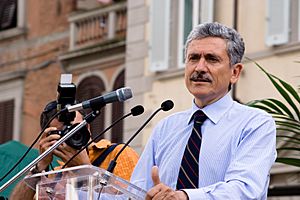
In 2010, D'Alema was elected president of the Parliamentary Committee for the Security of the Republic (COPASIR), a position he held until 2013. He also became president of the Foundation of European Progressive Studies (FEPS).
In 2012, when the PD tried out American-style primary elections, D'Alema wanted to keep the party's older traditions. He disagreed with the idea of changing the party to be more like Barack Obama's politics. From 2013, he was part of the left-wing minority within the PD. This group, including Pierluigi Bersani and Roberto Speranza, opposed Matteo Renzi's leadership. D'Alema's followers are known as dalemiani.
The dalemiani wanted the PD to have an anti-capitalist goal, rather than just trying to improve capitalism. They opposed Renzi's proposed changes to the constitution in the 2016 Italian constitutional referendum. When these reforms were defeated, Renzi's time as prime minister ended. In 2017, D'Alema left the PD because he disagreed with Renzi's policies. He helped found Article One, which became part of the Free and Equal political movement.
In the 2018 Italian general election, D'Alema did not win a seat in the Senate of the Republic. Since 2018, D'Alema has stepped back from active politics. He became a professor at Link Campus University. He also continues his work as president of the Italianieuropei Foundation, which he founded in 1998. In 2019, at a party event, D'Alema said: "Whoever wants to restore communism is brainless, whoever doesn't remember it is heartless... and I'm deeply sentimental."
More recently, in 2022, D'Alema's ideas about the PD's future were discussed again. He has called for an alliance between the PD and the Five Star Movement (M5S). He noted that many workers and people facing financial difficulties vote for the M5S more than the PD.
European and Foreign Policy Views
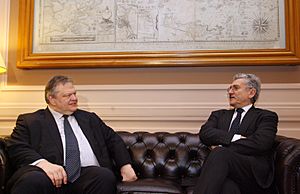
D'Alema was a Member of the European Parliament from 2004 to 2006. He has been involved in European politics, supporting stronger European integration. Since 2010, D'Alema has been the president of the Foundation for European Progressive Studies (FEPS).
As Italian Foreign Minister in 2006, D'Alema played an active role during the 2006 Lebanon War. Italy led talks with Israel and was suggested to lead a peacekeeping mission. D'Alema promised Italy's help to enforce the United Nations resolution on Lebanon. He urged other European Union countries to do the same, saying that stability in the Middle East was important for Europe. In 2013, he said that politicians must listen to people who doubt the European Union and offer solutions to their concerns.
Personal Life
D'Alema is married to Linda Giuva, who is a professor. They have two children, Giulia and Francesco.
D'Alema loves association football (soccer). He supports AS Roma, a football club, and has compared it to the political left. He said that like his political group, AS Roma fans are "not used to winning the big games, we trained to suffer and unprepared to rejoice." He also mentioned his admiration for Juve and his support for other teams when they play against Juve. He also liked Gianni Rivera from AC Milan.
Political Roles and Awards
Party Politics
- 1975–1980: National Secretary of the FGCI
- 1981–1986: Regional Secretary of the PCI in Apulia
- 1986–1989: Editor of the daily newspaper L'Unità
- 1986–1992: Member of the PCI/PDS national leadership
- 1992–1994: Chairman of the PDS members of Parliament
- 1994–1999: Leader of the PDS/DS
- Since 1996: Vice-chairman of the Socialist International
- 1998–2007: Chairman of the DS
Government Roles
- 1970–1976: Town councillor of Pisa
- 1985–1987: Regional councillor of Apulia
- 1987–2004: Chairman of the PCI/PDS/DS parliamentary group
- 1987–2013: Member of the Chamber of Deputies
- 1996–1998: Chairman of the Committee for Constitutional Reform
- 1998–2000: Prime Minister of Italy
- 2006–2008: Minister of Foreign Affairs
Awards and Honours
 Officer of the Legion of Honour (France), 2001.
Officer of the Legion of Honour (France), 2001. Grand Cross Knight of the Order of Merit (Chile), 2005.
Grand Cross Knight of the Order of Merit (Chile), 2005. Grand Cross Knight of the Order of Pope Pius IX (Vatican City), 2006.
Grand Cross Knight of the Order of Pope Pius IX (Vatican City), 2006. Grand Decoration of Honour for Services to the Republic of Austria (Austria), 2007.
Grand Decoration of Honour for Services to the Republic of Austria (Austria), 2007.- He also received high awards from Palestine and South Korea.
Books by Massimo D'Alema
Massimo D'Alema has written many books. Some of them were published by Mondadori, a company linked to Silvio Berlusconi.
- La crisi del paese e il ruolo della gioventù ("The Country's Crisis and the Role of Youth"). 1976.
- Dialogo su Berlinguer ("Dialogue on Berlinguer"). With Paul Ginsborg. 1994.
- Un paese normale. La sinistra e il futuro dell'Italia ("A Normal Country: The Left and Italy's Future"). With Gianni Cuperlo and Claudio Velardi. 1995.
- Progettare il futuro ("Shaping the Future"). Edited with Gianni Cuperlo and Claudio Velardi. 1996.
- La sinistra nell'Italia che cambia ("The Left in the Changing Italy"). 1997.
- La grande occasione. L'Italia verso le riforme ("The Great Chance: Italy Towards Reforms"). 1997.
- Parole a vista ("Words on Sight"). Edited by Enrico Ghezzi. 1998.
- Kosovo. Gli italiani e la guerra ("Kosovo: Italians and War"). Interview with Federico Rampini. 1999.
- Oltre la paura ("Beyond Fear"). 2002.
- La politica ai tempi della globalizzazione ("Politics in the Time of Globalization"). 2003.
- A Mosca, l'ultima volta. Enrico Berlinguer e il 1984 ("In Moscow, the Last Time: Enrico Berlinguer and 1984"). 2004.
- Il mondo nuovo. Riflessioni per il Partito democratico ("The New World: Reflections for the Democratic Party"). 2009.
- Controcorrente. Intervista sulla sinistra al tempo dell'antipolitica ("Countercurrent: Interview on the Left at the Time of Anti-Politics"). Edited by Giuseppe Caldarola. 2013.
- Non solo euro. Democrazia, lavoro, uguaglianza. Una nuova frontiera per l'Europa ("Not Just Euros: Democracy, Labour, Equality. A New Frontier for Europe"). 2014.
Images for kids
-
D'Alema with Romano Prodi and Silvio Berlusconi in 1996
See also
 In Spanish: Massimo D'Alema para niños
In Spanish: Massimo D'Alema para niños
 | Sharif Bey |
 | Hale Woodruff |
 | Richmond Barthé |
 | Purvis Young |


